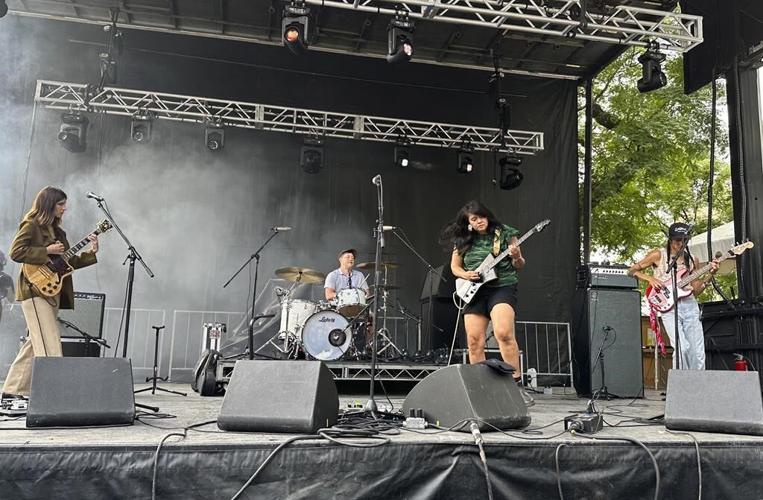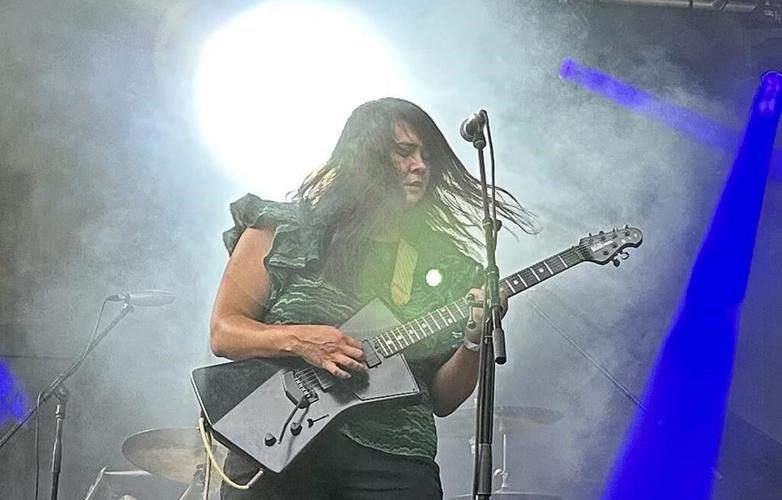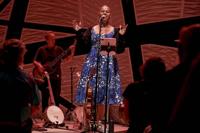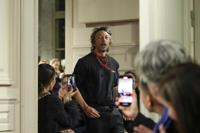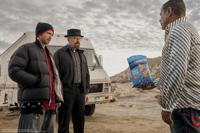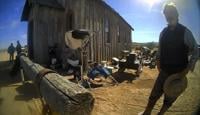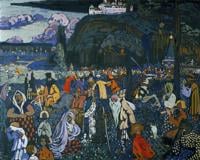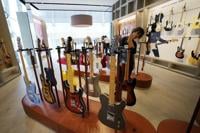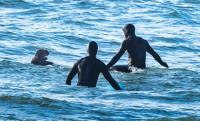CHICAGO (AP) — The beginning of the pandemic was devasting for the leader of the indie rock band Black Belt Eagle Scout, Katherine Paul. All her tours, including one headlining across North America, were canceled and she feared her ascending music career might be over.
She got a day job at a nonprofit and returned to the homelands in Western Washington. But as Paul, or KP to her friends, spent time in the cedar forests and walked along the Skagit River, she turned to her guitar to deal with the isolation and stress. Those snippets, recorded on her phone, provided the foundation for what would become songs on her powerful, grunge-soaked new record “The Land, The Water, The Sky.”
“I feel like if the pandemic hadn't happened, I probably wouldn't have made this record,” said KP, who writes the songs, sings and plays guitar in the band that was the only Native American artist at the Pitchfork Music Festival in Chicago this month.
“I spent a lot of time outside. I spent a lot more time than normal going on hikes, being part of the land,” she continued. “It’s not like I never do that stuff but it brought me back to a place where this is who I am."
The new record, which came out in February, helped launch what has probably been the most successful year so far for Black Belt Eagle Scout. The band toured Europe and will go to Australia later this year. Two of her songs, “Soft Stud” from an earlier record and “Salmon Stinta” from her latest, appear this season on the television series “Reservation Dogs.”
Reservation Dogs Music Supervisor Tiffany Anders said she was introduced to the band's music by the show's creator, Sterlin Harjo, when they started working on the second season.
“It’s always been important for us on this show to include Native American artists, but beyond representation, Black Belt Eagle Scout’s music is beautiful and emotional, and fits these characters, their world and landscape — and the vibe of the show,'” she said in a statement.
Then there was Pitchfork, a three-day festival that is a significant milestone for indie musicians. The festival is held every year in Chicago's Union Park and this year's headliners included Bon Iver, Big Thief and The Smile, which has members of Radiohead.
She admitted stepping on that stage last weekend was nerve-wracking given her high hopes for the show, a feeling compounded by concerns that storms could scuttle their performance. But as she launched into the blistering set of mostly new songs in front of thousands of eager fans, KP found solace in her guitar. She launched several long jams that were punctuated by her twirling her jet-black hair around to the point it obscured her face.
“It was totally a moment,” she said with a laugh.
“I kind of cried after we played because it felt so meaningful,” she added. “Like, I’ve always wanted to play this music festival. I remember trying to play one of the years before the pandemic when I was touring and it didn’t happen. This year, I was just so stoked to play.”
Reaching Pitchfork has been a long journey for the 34-year-old artist, who is a member of the Swinomish Indian Tribal Community and left her home on the reservation in LaConner, Washington, when she was 17 to attend Lewis & Clark College in Oregon and play rock music.
Growing up on the reservation off the Washington coast on islands in the Salish Sea, she drummed and sang cultural songs. As a teenager, she discovered local Pacific Northwest bands like Mount Eerie and the sounds of the Riot Grrrl movement and played one of her first gigs at a small bar called Department of Safety. She moved to Portland, Oregon, due to its outsized role in the indie scene that featured bands like Sleater-Kinney and quickly immersed herself in the music scene playing drums and guitar.
She joined an all-female outfit whom she met at the Rock ‘n’ Roll Camp for Girls in Portland. She went on to play a lot of small, basement shows with bands like Genders — whose wolf tattoo she still has on her left arm.
But she wanted to write her own songs and formed Black Belt Eagle Scout in 2013. Her early music was defined by her ethereal singing about love, friendship and healing — often only accompanied by minimal guitar strumming. But she did rock out on songs like “Soft Stud,” which featured searing solos.
“She is a really an authentic musician and she carries a lot of power on stage with her presence and sound,” Claire Glass, who plays guitar in the band and first saw KP seven years ago.
KP has said her Native American identify has always been present on her records. But her latest music paints a more vivid picture of life on the Swinomish reservation. There are references to chinook salmon, which are traditionally fished, and a powwow dance.
“I started thinking of feeling grateful for the life that I have been given; this place that I'm from; how much the land, the water, the sky means to me — being surrounded by it," KP said of writing the song ”Don't Give Up." “It has so much more meaning because the land, that’s where my people are from."
Her songs aren't meant to directly confront issues like the crisis of missing and or tribes' forced relocation. It's not the way she writes songs. Instead, she envisions them connecting with people, drawing more Native Americans to indie rock shows in places like Minneapolis, which has a vibrant Native American community, and inspiring young Native Americans to connect with her after shows.
“Isn’t me like being here existing with my music good enough? Can’t I just be who I am?” she asked, adding she doesn't need to speak out from stage about these issues because being Native often means she is already wrestling with them. A judge, for example, ruled in March that BNSF Railway intentionally agreement with the tribe by running 100-car trains carrying crude oil over the reservation.
“As a Native person, you know someone who is missing. Your tribe is trying to get your land back. Those are topics that are part of your every day life," she said. ”I care about those things deeply but there are certain ways in which my music is, maybe not as direct, but it can be healing.”
KP also doesn't want to be seen just as a rock musician or as a Native artist. “I am a musician who happens to be Native, but I am also a Native musician ... I think I am always both,” she said.
Her latest record aims to show that.
“I kind of had in the back of mind, just kept thinking what would Built to Spill do,” KP said of the guitar-heavy, indie-rock band from the Pacific Northwest. “I've gone on tour with them and seen their three guitars at one point playing together and how they overlap and all these other things."
It's also a more collaborative effort with more musicians playing on the record— a departure for KP, who is accustomed to doing everything herself. A cellist who played with Nirvana, Lori Goldston, is featured on several songs, as are two violinists, as well as a saxophone and mellotron player.
Takiaya Reed, a first-time producer who is also in a doom metal band, described the experience of working on the record as “beautiful and amazing" and said the two bonded over their love of punk. Reid also brought her classical training and love of “heavier sounds” to the studio.
“We approached it fearlessly. It was wonderful to be expansive in terms of sonic possibilities,” she said.
KP also wanted to find a place for her parents, whom she had grown especially close to during the pandemic, to play on the record. She chose the song “Spaces,” which she described as having a “healing vibe." Her dad, who is one of the main singers at the tribe's cultural events, embraced the idea of lending his powerful powwow chant to the song. Her mom sang harmonies.
KP said: “It meant the world to me to have my parents sing because it felt like it was full circle in who I am."

